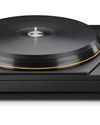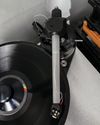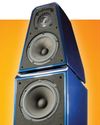
Power amplifiers should be boring. They have a single, well-defined function: Make the input signal large enough to run a loudspeaker so that it makes sound at levels suitable for listening to music. Generally, controls and features are few or none. Peter Walker of Quad famously defined the ideal amplifier as a “straight wire with gain.” That’s just one feature: gain.
That ideal is not easy to achieve, for many reasons. Even a straight wire of any practical length and structure has properties (resistance, capacitance, inductance) that can affect how the signal is transferred to it on one end and how the signal is transferred from it on the other. These effects can be within the audible range depending on what device is at each end. Insert a complex device like a real-world amplifier (with different wires in and out) and Walker’s ideal starts to seem unrealistic, although it should be possible to get close.
Walker further stated that an “audio power amplifier is required to produce an output signal that differs from the input signal in magnitude only.”1 In attempting to realize that goal, he tried both tubed and transistor designs (although he averred that the latter were superior). Today, with the availability of tube amps and an expanding range of solid state designs, we have a broad range of options but no better standard than Walker’s.
Esta historia es de la edición June 2021 de Stereophile.
Comience su prueba gratuita de Magzter GOLD de 7 días para acceder a miles de historias premium seleccionadas y a más de 9,000 revistas y periódicos.
Ya eres suscriptor ? Conectar
Esta historia es de la edición June 2021 de Stereophile.
Comience su prueba gratuita de Magzter GOLD de 7 días para acceder a miles de historias premium seleccionadas y a más de 9,000 revistas y periódicos.
Ya eres suscriptor? Conectar

Michael Des Barres and the Art of Aural Obsession
Listening to music inspires us to take action. Upon hearing an I.E.-Instant Earworm-we must then determine the best way we can go about listening to it again (and again) at our convenience.

PLANET OF SOUND
BLACK FRANCIS ON HARNESSING THAT MAGIC PIXIES DUST

T+A R 2500 R STREAMING RECEIVER PHONO MODULE
In my review of the T+A R 2500 R receiver (August 2024 issue), I covered many of its features and took as deep a dive as time and column inches allowed.

Audia Flight FLS10
The dogma of separates has long reigned supreme among audiophiles: If you're serious about sound quality, you're supposed to need a dedicated preamp and power amp.

Totem Acoustic Element Fire V2
Totem Acoustic was founded in 1987, in Montreal, Canada, by a former high school math teacher named Vince Bruzzese. The company's first product, the Model 1 loudspeaker,' impressed me so much I bought a pair.

MoFi Electronics MasterDeck
Get two mouthy jazz drummers in a room and watch the sparks fly. Talented turntable designer Allen Perkins, the brain behind Spiral Groove,2 Immedia's RPM turntables,³ and various SOTA models, is first and foremost a jazz drummer.

Soulution 727
AImost 14 years have passed since a review of a Soulution product appeared in the pages of Stereophile.\"

The Spin Doctor checks out the Kuzma Safir 9, a superarm from Slovenia.
The British audio scene from the late 1970s through the mid-1980s was pretty strange. Audio as a hobby was a big deal, with widespread appeal to a much younger crowd than today. Audiophiles were guided by a flurry of what my friends called \"hi-fi pornos,\" audio magazines that filled the racks at the newsagents.

Alex goes to Japan
Arriving in Japan from the United States is like being turned upside down. This condition lasts for much of the first week. When I visited in November, the time difference between Tokyo and New York was 14 hours. \"The floating world\" is a term for the pleasure-addled urban culture of Edo-period Japan, but it's also an apt description for the twilit and not-entirely-unpleasant weirdness of first arriving in Tokyo. Everything seems slightly unreal.

Wilson Audio Specialties The WATT/Puppy
Since the original WATT/Puppy concept kicked off in the late 1980s,' there has been a 40-year evolution leading to the latest version reviewed here.